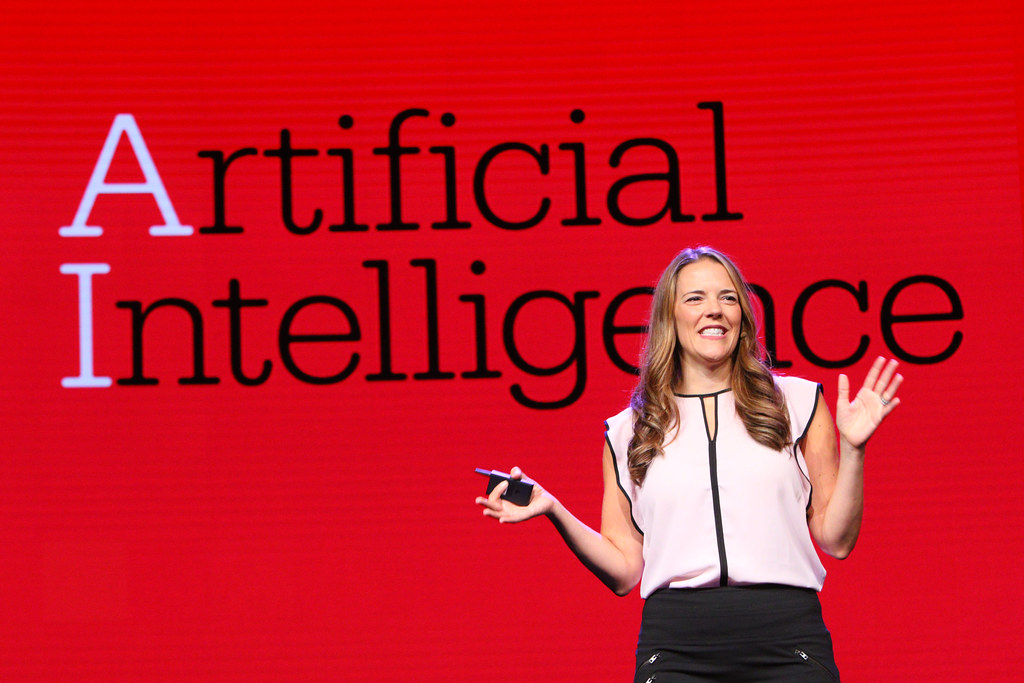Concerning AI for targeted marketing, you have a powerful tool at your fingertips. By utilizing AI technology, you can effectively reach your audience with personalized messages and offers. In this guide, we will walk you through the step-by-step process of how to harness the power of AI for your marketing campaigns. From data analysis to predictive modeling, we will show you how to leverage AI to increase your marketing success.
Understanding AI in Marketing
For a better grasp of AI in marketing, here are some chatGPT prompt samples related to this section:
- Explain the role of AI in marketing.
- How can AI be utilized for targeted marketing?
- What are the benefits of incorporating AI in marketing strategies?
What is AI in Marketing?
Any discussion about AI in marketing must begin with a clear understanding of what AI actually is in this context. AI in marketing refers to the use of artificial intelligence technologies to analyze consumer behavior, predict trends, personalize marketing efforts, automate tasks, and ultimately enhance the overall marketing strategy. This can include machine learning algorithms, natural language processing (NLP), and other AI tools that help marketers make data-driven decisions and optimize their campaigns.
Here are some chatGPT prompt samples related to the subsection ‘What is AI in Marketing?’:
- Define AI in marketing and its significance.
- How does AI contribute to modern marketing practices?
- Can you explain the concept of AI-driven marketing?
Benefits of Using AI in Marketing
There’s no denying the numerous benefits that come with leveraging AI in marketing. By incorporating AI technologies into your marketing efforts, you can enhance customer segmentation, personalize interactions, optimize campaigns in real-time, and improve overall marketing ROI. AI can also help automate repetitive tasks, analyze vast amounts of data quickly, and provide valuable insights that can inform strategic decision-making.
Here are some chatGPT prompt samples related to the subsection ‘Benefits of Using AI in Marketing’:
- Explain the advantages of using AI for marketing.
- How does AI enhance customer engagement in marketing?
- What are the key benefits of integrating AI into marketing strategies?
There’s one more aspect to consider when it comes to the benefits of using AI in marketing: scalability. AI tools allow you to scale your marketing efforts efficiently, enabling you to reach a larger audience while maintaining personalized communication and tailored messaging. This scalability is crucial for businesses looking to expand their reach and maximize the impact of their marketing campaigns.
Here are some chatGPT prompt samples related to the subsection ‘Benefits of Using AI in Marketing’:
- How does AI help in scaling marketing efforts?
- Can you elaborate on the scalability benefits of AI in marketing?
- Why is scalability important in AI-driven marketing strategies?
To fully harness the power of AI in your marketing endeavors, it’s vital to understand its role, benefits, and scalability. By incorporating AI technologies into your strategies, you can not only streamline your processes but also elevate your marketing efforts to new heights, reaching and engaging with your target audience in more meaningful ways.
Preparing for AI-Powered Targeted Marketing
Some key steps must be taken before stepping into AI-powered targeted marketing to ensure that you are well-prepared. Here are a few prompts that you can use to aid in this process:
1. Describe your current marketing strategy and target audience.
2. List the different demographics you currently target in your marketing efforts.
3. Identify the pain points and needs of your target audience.
4. Outline the customer journey and touchpoints.
5. Brainstorm potential personalized marketing campaigns.
Identifying Your Target Audience
Audience identification is the first crucial step in preparing for AI-powered targeted marketing. By clearly defining your target audience, you can tailor your marketing efforts more effectively. Here are some prompts to help you identify your target audience:
1. List the characteristics of your ideal customer.
2. Describe the typical buying behavior of your target audience.
3. Identify the key motivators that drive your target audience to make a purchase.
4. Analyze the channels your target audience frequently engages with.
5. Define the pain points or challenges your target audience faces.
Collecting and Analyzing Customer Data
The collection and analysis of customer data are vital in AI-powered targeted marketing. You need to gather relevant data about your customers to create personalized marketing campaigns. Here are some prompts to help you with this process:
1. Collect data on customer demographics, behavior, and preferences.
2. Analyze customer interactions with your website, emails, and social media.
3. Utilize customer surveys and feedback to gather insights.
4. Segment your customer database based on various criteria.
5. Predict future customer behavior based on past data.
The collection and analysis of customer data are imperative for successful AI-powered targeted marketing. By understanding your customers’ preferences, behaviors, and needs, you can create personalized campaigns that resonate with them.
1. Describe the importance of data-driven marketing strategies for targeted campaigns.
2. Analyze the benefits of using AI to analyze customer data for personalized marketing.
3. Explain how AI algorithms can help in predicting customer behavior and preferences.
4. Discuss the role of machine learning in improving targeted marketing efforts.
5. Explore the ethical considerations of using AI in targeted marketing.
Setting Up Your AI Marketing Tools
Identifying and implementing the right AI marketing tools is imperative for the success of your targeted marketing campaigns. By leveraging AI technology, you can automate processes, analyze data more effectively, and personalize your marketing efforts. Here are some prompts to guide you in setting up your AI marketing tools:
1. Research and select AI tools that align with your marketing goals.
2. Integrate AI tools with your existing marketing platforms.
3. Train your team on how to use AI tools effectively.
4. Set KPIs to measure the success of your AI-powered campaigns.
5. Test different AI algorithms to optimize your marketing strategies.
Even with the best AI marketing tools at your disposal, it’s crucial to regularly monitor and evaluate their performance. By analyzing the results and adjusting your strategies accordingly, you can ensure that your targeted marketing campaigns are effective and impactful.
1. Examine the scalability of AI tools for future marketing needs.
2. Discuss the importance of data security and privacy when using AI marketing tools.
3. Explore the role of AI in real-time personalization for marketing campaigns.
4. Evaluate the cost-effectiveness of using AI for targeted marketing.
5. Share success stories of businesses using AI for personalized marketing.
How to Choose the Right AI Marketing Platform
Now that you’re considering using AI for targeted marketing, it’s crucial to choose the right AI marketing platform. Here are some factors to consider when making this decision:
Factors to Consider When Selecting an AI Platform
- AI capabilities and features
- Data integration and compatibility
- Scalability and customization options
- Ease of use and user interface
- Pricing and ROI potential
- Support and training options
- Security and compliance measures- Knowing your specific marketing needs and goals is crucial when selecting an AI platform for targeted marketing. Ensure the platform aligns with your business objectives and can adapt to your requirements.
Tips for Evaluating AI Marketing Vendors
Even with a list of potential AI marketing vendors, evaluating them can be overwhelming. Here are some tips to guide you:
- Request demos and trial periods
- Check customer reviews and case studies
- Inquire about their data handling and security practices
- Assess their customer support and training resources
- Consider their track record and experience in AI marketing
- Evaluate their scalability and flexibility for future growth- Knowing the reputation and reliability of AI marketing vendors can significantly impact the success of your targeted marketing campaigns. Take the time to research and choose a vendor that can meet your expectations and deliver results.
Top AI Marketing Platforms for Targeted Marketing
Choose the right AI marketing platform by exploring some of the top options in the market:
1. Salesforce Marketing Cloud
2. Adobe Marketing Cloud
3. Marketo
4. HubSpot
5. IBM Watson Customer Experience AnalyticsTo ensure that you select the most suitable AI marketing platform for your targeted marketing needs, evaluate each platform’s features, integration capabilities, support services, and pricing models. This will help you make an informed decision that aligns with your business objectives.
Building AI-Driven Customer Profiles
Once again, leveraging AI technology can significantly enhance your marketing efforts by allowing you to create detailed customer profiles. These profiles are crucial for understanding your target audience on a deeper level, enabling you to tailor your marketing strategies effectively. By analyzing vast amounts of data, AI can help you identify patterns, preferences, and behaviors of your customers, enabling you to segment them more accurately.
- Generate customer profiles based on demographic data
- Analyze customer interactions to understand behavior
- Predict customer needs and preferences for targeted marketing campaignsHow to Create Accurate Customer Profiles
Building precise customer profiles is crucial for personalized marketing strategies. Using AI, you can analyze customer data such as demographics, purchase history, online behavior, and interactions with your brand to create detailed profiles. By incorporating machine learning algorithms, AI can help you segment customers based on their preferences, making your marketing efforts more targeted and efficient.
- Use AI to analyze customer data and identify trends
- Predict customer lifetime value for personalized marketing
- Personalize marketing messages based on customer behaviorUsing AI to Enhance Customer Segmentation
Customer segmentation is a key component of targeted marketing, and AI can revolutionize this process. By applying AI algorithms to analyze customer data, you can segment your audience into specific groups based on their preferences, behaviors, and purchase patterns. This advanced segmentation allows you to deliver personalized content and offers to each segment, increasing engagement and conversion rates.
- Utilize AI to segment customers based on real-time data
- Predict customer behavior to tailor marketing campaigns
- Identify high-value customer segments for personalized marketingAIDriven Tips for Creating Personalized Customer Experiences
Creating personalized customer experiences is crucial for building strong relationships and driving customer loyalty. AI can help you achieve this by analyzing customer data to understand their preferences and behavior. By leveraging AI-driven insights, you can tailor your messaging, recommendations, and offers to each customer, enhancing their overall experience with your brand.
- Analyze customer feedback to improve personalized experiences
- Use AI to predict customer preferences for product recommendations
- Personalize email marketing campaigns based on AI insights- By implementing these AI-driven strategies, you can create hyper-personalized experiences for your customers, increasing engagement and loyalty.
- Knowing your customers better through AI analytics can help you stay ahead of competitors and win customer trust.
On top of improving customer segmentation, AI can also assist in creating personalized customer experiences. By utilizing AI algorithms to analyze customer data and behavior, you can tailor your marketing campaigns to meet individual preferences. This level of personalization can significantly enhance customer satisfaction and increase brand loyalty.
- Use AI to personalize product recommendations for each customer
- Analyze customer feedback to improve personalized interactions
- Predict customer behavior to offer customized solutionsCustomer satisfaction is crucial in today’s competitive market landscape. By utilizing AI to enhance customer segmentation and personalize experiences, you can stay ahead of the curve and build lasting relationships with your audience.
AI-Powered Content Creation and Distribution
After harnessing the power of AI for targeted marketing, the next step is leveraging AI for content creation and distribution. AI can assist in generating high-quality content quickly and efficiently, allowing you to reach your target audience with personalized and engaging material. By utilizing AI tools, you can automate content creation, enhance the quality of your copy, and optimize distribution strategies for maximum impact.
How to Use AI for Content Generation
The advancement of AI technology has revolutionized content generation, making it easier than ever to create compelling material for your audience. AI-powered writing tools like chatGPT can assist you in generating blog posts, social media content, product descriptions, and more. By providing the AI with specific prompts and guidelines, you can tailor the generated content to suit your brand voice and messaging.
- Generate an engaging blog post on the topic of digital marketing trends for 2022.
- Create compelling product descriptions for a new line of skincare products.
- Draft social media posts to promote an upcoming webinar on AI technology. Tips for Optimizing AI-Generated Content
The ability to optimize AI-generated content is crucial to ensure that the material aligns with your brand’s tone, style, and messaging. When using AI for content creation, it’s imperative to provide clear and detailed prompts to guide the AI in generating relevant material. Additionally, reviewing and editing the AI-generated content before publishing can help refine the copy and enhance its quality for your target audience.
- Generate product descriptions based on specific features and benefits.
- Create SEO-optimized blog content for improved search engine visibility.
- Draft engaging social media posts with a call-to-action to drive audience engagement. - Always review and edit AI-generated content to ensure accuracy and relevance for your audience.
- Consider customizing content generated by AI to add a personal touch and connect with your audience on a deeper level. Thou
Using AI for Content Distribution and Promotion
It’s not just about creating compelling content; effective distribution and promotion are imperative for reaching your target audience. AI can help you identify the best channels to distribute your content, optimize posting schedules for maximum engagement, and even assist in running targeted advertising campaigns. By leveraging AI for content distribution and promotion, you can enhance your marketing efforts and increase your reach to potential customers.
- Identify the most effective social media platforms to distribute your content.
- Optimize posting schedules for increased audience engagement and reach.
- Create targeted advertising campaigns based on audience demographics and behavior. Promotion
In the matter of content distribution and promotion, AI can be a valuable ally in helping you streamline your marketing efforts and reach a larger audience. By utilizing AI tools to analyze data, predict trends, and automate certain tasks, you can optimize your content distribution strategies for maximum impact. Whether it’s scheduling social media posts, targeting specific audience segments, or optimizing ad placements, AI can help you achieve your marketing goals more efficiently.
- Use AI to analyze audience behavior and preferences for personalized content recommendations.
- Optimize email marketing campaigns with AI-generated subject lines and content.
- Identify influencers and partners for collaborations based on AI-driven analytics. Content
By leveraging AI for content creation and distribution, you can streamline your marketing efforts, reach a wider audience, and drive engagement with personalized and compelling material. Incorporating AI-powered tools into your marketing strategy allows you to optimize your content generation process, enhance the quality of your copy, and maximize the impact of your distribution and promotion efforts. Whether you’re creating blog posts, social media content, or email campaigns, AI can help you connect with your audience on a deeper level and achieve your marketing goals more efficiently.
Measuring and Optimizing AI-Driven Marketing Campaigns
Unlike traditional marketing campaigns, AI-driven marketing allows for more precise and data-driven measurement of campaign performance. This chapter will guide you on how to effectively measure and optimize your AI-driven marketing campaigns to maximize their success.
How to Track and Measure AI Marketing Performance
Assuming you want to track the performance of your AI-driven marketing campaigns, you can use various metrics like conversion rates, click-through rates, engagement levels, and customer acquisition costs. Additionally, you can analyze data such as customer demographics, behaviors, and preferences to tailor your marketing strategies accordingly.
- How can you effectively measure the success of your AI-driven marketing campaigns?
- What are the key metrics to track when evaluating the performance of AI marketing initiatives?
- How can AI tools help you analyze customer data and optimize marketing strategies?
Factors to Consider When Analyzing AI Marketing Data
Assuming you are analyzing the data generated by your AI marketing campaigns, it’s crucial to consider factors like data accuracy, relevancy, and ethical implications. Ensure that the data used is up-to-date and accurate to make informed decisions. Moreover, consider the ethical aspects of data collection and usage to maintain customer trust and compliance with regulations.
- What are some best practices for analyzing and interpreting AI marketing data?
- How can you address data privacy and security concerns when analyzing customer data?
- What ethical considerations should you keep in mind when using AI for marketing purposes?
Clearly, when analyzing AI marketing data, you should also pay attention to data protection laws and ensure compliance with regulations like GDPR or CCPA. Recognizing the importance of data integrity and transparency can help build trust with your audience and enhance the effectiveness of your marketing strategies.
- Consider the impact of data privacy laws on your AI marketing initiatives.
- Ensure transparency and accountability in how you collect and use customer data.
- Recognizing the significance of data ethics in AI marketing can improve customer loyalty.
Tips for Refining and Improving AI Marketing Strategies
For instance, to refine and improve your AI-driven marketing strategies, you can conduct A/B testing on different ad creatives, messaging, or target audiences to optimize your campaigns. Additionally, leveraging AI tools for predictive analysis can help you anticipate customer behavior and preferences, enabling you to tailor your marketing efforts more effectively.
- How can you use A/B testing to enhance the performance of your AI marketing campaigns?
- What are the benefits of using predictive analysis in refining marketing strategies?
- How can you leverage AI technologies to personalize marketing content and improve engagement?
Marketing automation tools can streamline your workflow and improve efficiency in campaign management. Thou, incorporating AI algorithms for personalized recommendations can enhance customer experiences and drive conversions. Recognizing the potential of AI technologies in refining marketing strategies is crucial for staying ahead in a competitive market.
- Experiment with different AI tools to optimize your marketing campaigns.
- Embrace AI-powered personalization to enhance customer engagement and retention.
- Thou, continuous monitoring and refining are key to maximizing the impact of AI in marketing.
Marketing strategies leveraging AI have the potential to revolutionize how businesses interact with customers and drive sales. By implementing AI-driven solutions and continuously refining your strategies based on data insights, you can stay competitive in today’s fast-paced digital landscape.
- How can AI technologies help marketers optimize their strategies and improve ROI?
- What are some practical ways to incorporate AI into your marketing efforts for better results?
- Why is it crucial to adapt and refine AI marketing strategies in response to evolving consumer behavior?
Summing up
The step-by-step guide provided in this article has equipped you with the knowledge and tools necessary to effectively use AI for targeted marketing. By understanding the process of data collection, analysis, segmentation, personalization, and evaluation, you can enhance your marketing efforts and reach your target audience more efficiently. Remember to continuously optimize your AI strategies based on the insights you gather, ensuring that you stay ahead in the competitive landscape of digital marketing.





0 Comments